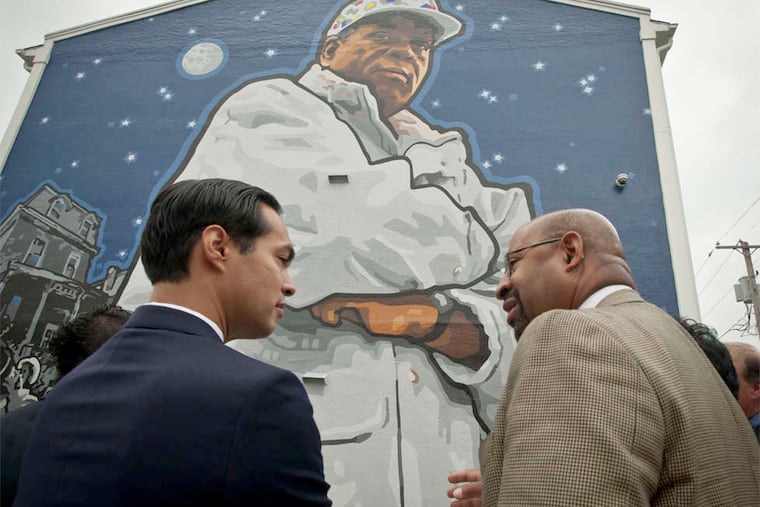Nutter touts urban planning as his legacy achievement as mayor
With his time in office growing shorter, Mayor Nutter on Monday will make his case that his administration's seven-year focus on urban planning has left Philadelphia a more vibrant, first-tier city that has yet to peak.

With his time in office growing shorter, Mayor Nutter on Monday will make his case that his administration's seven-year focus on urban planning has left Philadelphia a more vibrant, first-tier city that has yet to peak.
Touting the rewritten zoning code, a new comprehensive development plan, and the Planning Commission's return to primacy in development matters, Nutter will argue that the framework is set for the city's continued growth as a model urban center.
He will do so in a speech to the Pennsylvania Chapter of the American Planning Association, which invited the mayor to offer his assessment of the last seven years. The address will afford Nutter an opportunity to begin cementing the legacy he hopes to leave when his second term ends a year from January.
Central to that legacy, Nutter believes, is the extensive investment his administration has made in creating a template for how future development unfolds in Philadelphia.
"I knew, coming in as mayor, we needed to get the planning and the zoning and the development process under control," Nutter said in an interview Friday. "We needed to make it more straightforward and transparent. And we have done that. And those are critical components for moving the city forward."
Among successes Nutter will tout in his speech:
The restoration of the City Planning Commission's "rightful role" as the driver of Philadelphia's planning process.
A new zoning code that, in replacing a confusing patchwork, has created consistency and predictability for development.
Philadelphia 2035, the first comprehensive development plan for the city since 1960. The plan, as an overview, is complete. Ten of 18 more-focused district-level plans are still to be finished.
The Lower Schuylkill Master Plan, which reimagines the riverfront from Center City to the airport.
A total of $8.5 billion in new development completed, started, or announced since January 2013.
The transformation of Dilworth Plaza and the creation of the Schuylkill River Boardwalk.
Less grand but as important to quality of life, Nutter says, are the 500 miles of new bike lanes and the 2,400 intersection lights that have been retimed to favor pedestrians.
In his speech, Nutter will credit much of the administration's success to Alan Greenberger, deputy mayor for economic development and chairman of the Planning Commission.
Greenberger said that from Day 1, Nutter insisted the administration establish a consistent, unified plan for the city's development.
"He believes it is the way one frames and guides the future," Greenberger said. "Planning is a way in which the collective willpower of government, private investment, and the community get in alignment. When values are aligned properly, there is a sense of predictability and confidence in the future."
In the interview, Nutter traced his focus on urban planning to his 14-plus years as a district representative on City Council.
Working with developers and constituents, Nutter said, he saw firsthand "the city's zoning code was archaic, hard to read, and hard to understand."
"You should not have to have a Ph.D or a law degree to read the zoning code," he said.
There was also "a culture in development" he wanted to change.
"It was more about who you knew or who you were than the quality of your idea or the need for the certain kinds of development in certain places," Nutter said.
With the reworked zoning code, citywide comprehensive plan, and master plans for the Schuylkill and Delaware River waterfronts, Nutter said he would leave future mayors a solid yet flexible framework to guide development.
"They have a road map, a guidebook," Nutter said. "These are living, breathing documents, but they are not written in stone. They are written in such a way as to give future mayors flexibility."
What he does not want changed, he said, is public participation in development decisions.
He cited the extensive public meetings held as the city developed plans for its riverfronts.
"I think going forward, people are going to expect that we maintain that level of community engagement," he said.
Nutter acknowledged that as a legacy, planning documents and zoning codes are a bit less tangible than large public-works projects.
"I've never been about building monuments," he said. "For me, it was always about the future. How to leave something in place that was comprehensive, more long-lasting in nature, that would benefit the greatest number of people. Your work has to be about the city, not about yourself."
215-854-2594